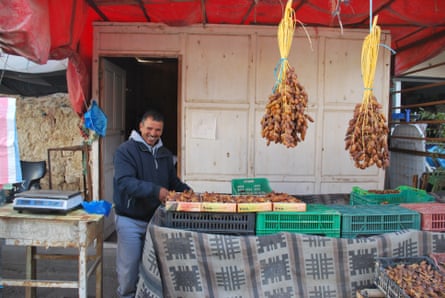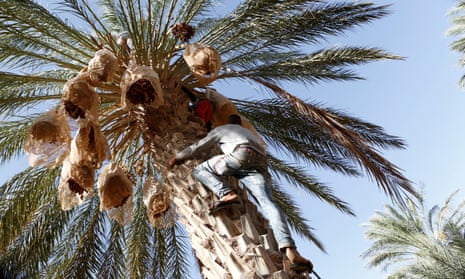Mansour Rajeb is wrapping a plastic protective sheet around the branch of a date palm in his oasis near the village of Bchelli, in southern Tunisia. Tying it up, he lingers.
“I’m worried,” he says. “The quality is getting worse. The dates are getting drier.”
Like thousands of farmers across the region, the effects of the climate crisis and water scarcity are threatening his livelihood. “When the quality is poor, we receive lower prices. I’m earning less. This year, I’ll earn a third of last year, which was an average year.”
On the road out of Bchelli, a gust of wind makes the sand rise like steam. Beyond the palm trees lies desert, a flat, barren terrain of scrub, rock and sand. Communities have survived here for thousands of years, but the changing environment may soon make it uninhabitable.
Overall, temperatures here have risen by about 1C (1.8F) since 1988, according to data collected by the meteorological office in Tozeur, the capital of the region’s western district.
“Temperatures used to peak in August and then fall, but now the heat persists until October,” says Taieb Foudhaili of South Organic, a date exporting company based in Kebili. Given this pattern of warming, humidity levels are falling and the plants adapt by releasing water. The result, says Foudhaili, is a drier, poorer product. His company must now do more sorting to maintain quality standards.
Global heating has also created shorter periods during which date palms can flower and pollinate, according to Nabila el-Kadri, an agronomist based in Kebili. As a consequence, Kadri has observed a decline in the productivity of dates per hectare.
But it is not just rising temperatures causing anxiety. Over recent decades, and particularly after Tunisia’s 2011 revolution, unlawful plantations have spread like blots across the white landscape. The state has failed to exert proper controls. There are now 38,000 declared hectares (93,860 acres) of palm tree across the Kebili region, though Kadri believes the real figure could be as high as 50,000 hectares. More than half of the country’s dates are produced here.
After olive production, dates are Tunisia’s second most valuable agricultural export, generating more than $200m (£154m) a year.
A consequence is growing water scarcity: date palms are thirsty. On each plantation, Kadri estimates there are between 100 and 140 palm trees per hectare, with each tree requiring roughly 20–25,000 cubic metres of water each year. Neither natural springs nor groundwater can meet this demand.
Farmers are resorting to drilling and pumping water from aquifers. There are now about 30,000 wells across the country, some hundreds of metres deep. As many as half of these were drilled illegally, according to a 2017 report by Tunisia’s Ministry of Agriculture, and less than half of the water from wells is not renewable.
Water levels are being increasingly overexploited across southern Tunisia.
“If we keep creating these new oases, with thousands of hectares of new trees, then over 10 to 15 years we won’t have any water left,” says Kadri.

Some are already suffering. Rajeb says he has farmer friends who have already sold their trees in the new, poorly irrigated oases, because their crop was “so feeble”. Kadri says it is only a matter of time before date production as a whole will have to migrate north to Gafsa.
Ultimately, the problems of global heating and water scarcity facing Tunisia’s date farmers arise from a similar myopia: a common failure to see things holistically.
“We are only thinking about the product,” says Foudhaili, “when we should be thinking about the air, the tree and the soil. We need to change the way we think.”
Many of Tunisia’s modern palm plantations are monocultures, producing the valuable Deglet Noor variety of date and little else. When this crop fails, farmers have little to fall back on.
Lying in the shade of a palm tree in Chebika, 71-year-old Younes Belgasim is a figure of hope. His oasis is thriving.
He is one of an estimated 18,000 people benefiting from a $5.7m World Bank project that launched in 2014. The project provided him with seeds for vegetables and fruit trees, helped him improve his land’s soil and irrigation, and allowed him to erect better fencing to protect his plot from local wild boars.
The initiative supported Belgasim to restore a “three-level” system of inter-cropping. On his oasis, the date palms give shade to vines, banana, pomegranate and fig trees, while vegetables and wild grasses grow beneath.
This system demands more from farmers, and it may deliver less immediate commercial payoff than date production. Both factors may deter farmers looking to earn their revenue in one date harvest season.
But while some inter-cropping farmers in the oases say the system can demand more water, they also report that it maintains humidity levels, improves the soil quality and strengthens biodiversity. It also diversifies farmers’ assets.
These successes suggest ecosystem-based farming can be a win-win: protecting farmers from climate, economic or disease-related shocks, while also preserving the natural environment. For this reason, Belgasim is more relaxed about the future.
“It is getting hotter,” he says, “but I’m not worried about climate change.”
